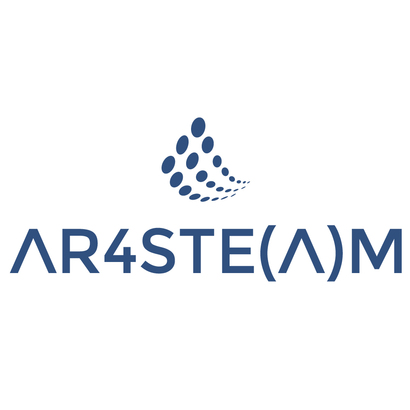European Projects:
Use gamification strategies and augmented reality for innovative STE(A)M learning
Dec. 2019 – May 2022 | Erasmus+ | KA2 | Strategic Partnership | Project n.2019-1-DE03-KA201-059708
Aim
Gamification has gained considerable interest in education circles due to its capability of enhancing the learning process among students.
In addition, Augmented Reality (AR) pretends to provide the learner/user with effective access to information through real-time immersive experiences.
In this context, the project envisages to strengthen the link between science education and creativity providing upper secondary schools with immersive technologies (Augmented Reality) for teaching and learning STE(A)M thus providing quality access and opportunities to a huge mass of students to perform experiments and practice their skills in a collaborative and risk-free learning environment.
Immersive technology (AR) can contribute to transform STE(A)M perception making difficult and sometimes boring subjects much more attractive thus encouraging students to choose STEM related studies and pursuing a career in the field to further succeed in the global labor market.
Moreover, a lot of STEM scenarios are just impossible to show in traditional education, therefore the overall objective of the project is to adequately support upper secondary schools teachers in using innovative ICT technologies during their STE(A)M lessons in order to overcome and improve the traditional method of teaching and learning in class and increase students’ motivation “learning by playing”.
Upper secondary school teachers will be provided with high quality professional development opportunities to acquire knowledge, competences and skills to effectively embed innovative methodologies (AR) to practice game-based learning while teaching and guide their students (age 14-18 years old) in facing obstacles when approaching science education.
For this purpose, game-based approaches and augmented reality applications will be recommended in order to offer upper secondary students hands-on experiences in which they could be actively involved and therefore make the learning of science more like the practice of science.
The more effective is teachers’ interaction the better students’ attitudes and creativity enhancement.
Objectives:
Integrate immersive technologies and game-based learning in upper secondary schools’ educational programs and foster school teachers capacity to teach STE(A)M effectively. They will be engaged to give their students experimental support for game-based learning activities in science education through the use of augmented reality and thus facilitate an inquiry-oriented teaching.
In addition, the use of innovative digital technologies during classroom will nurture students’ conceptual understanding, improve observation on real life aspects and stimulate reflection making them leading actors within the learning process.
Results:
- Compendium of gamification strategies based on Augmented Reality for STE(A)M learning;
- Teacher Training Programme;
- Innovative STE(A)M laboratories.
Website:
Online teacher training course:


PARTNERSHIP:
Applicant:
DIPF – German Institute on Educational Research and Information – DE
Partners:
EFFEBI Association – IT
Istituto Tecnico per il Turismo “Marco Polo” – IT
“Niekée/Agora” secondary school – NL
Samandira Vocational and Technical High School – TK
COIN, Cosmic Innovation – CY
AEDE, European Teachers’ Association – BE


